
0996 Emperor Otto III issues a deed to Gottschalk, Bishop of Freising, which is the oldest known document using the name Ostarr;îchi (Austria in Old High German). The document states that the term is used in the vernacular, which is taken to mean that the term must have been used before the document was issued. The document also implies that the term Ostmark, a concise 19th century translation of the Latin marchia orientalis which had later been appropriated by the Nazis, is un-historic. It appears that the translation of the Latin term into German in the time when the document was issued was actually Ostarrîchi, i.e. Eastern realm. [For further details, Click here.]
1885 Birth: Anton Flettner: German inventor who produced a practical helicopter for the German navy (1940). He also developed a device that allowed airplane pilots to raise or lower a plane's nose for better control. It evolved into a mechanism called the Flettner trim-tab control which is still used on all airplanes. He designed a rotor ship (1924) on which he replaced sails with unique propulsion: two 50-ft cylinders, electrically rotated, mounted vertically on the deck. A transatlantic voyage was accomplished using the aerodynamic power of the Magnus Effect which builds pressure behind a rotating cylinder. After WW II, he went to the US, and conducted helicopter research for the U.S. Army. He also invented a windmill and the Flettner marine rudder."
1914 World War I: Various:
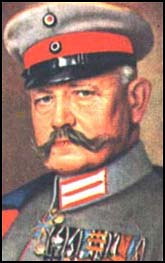
Hindenburg is appointed Commander-in-Chief of the Austrian-German Eastern Front. Ludendorff remains his chief of staff.

List Regiment (Oct 29-31): Kaiser Wilhelm II makes a very brief, surprise visit to Infantry Recruit Adolf Hitler's 1st Company, 16th Bavarian Reserve Infantry, in their battlefield trenches. From the account of an Infanterist eye-witness:
On a clear, mild early November morning, the Kaiser suddenly appeared at the Front. On time, and quite early, it was certainly before 8 o'clock. And quite close to the furthest trenches. A few hundred paces away, English gunners threatened. What did the Kaiser do? He laughed, because the Englishmen had shot up the lions on our battalion flag, and he congratulated our leaders on the courage of the regiment. Then he dashed off in the waiting car. [For further details, Click here.]
War at Sea: Admiral Graf von Spee's China Squadron, two heavy and three light cruisers, sinks two British heavy cruisers without losing a single ship in the Battle of Coronel, off the coast of Chile. Some time later the British battle cruisers Invincible and Inflexible, under Vice Admiral Sir Frederick Sturdee, seek out Spee, who had taken his squadron around Cape Horn into the South Atlantic. Spee had planned to raid the British wireless and coaling station at Port Stanley in the Falkland Islands, but discovered Sturdee's squadron there, refueling. The surprised Germans fled and were pursued and destroyed; approximately 1,800 Germans--including Admiral Spee--perished on the sunken ships.

1915 World War I (Oct 4, 1915 - Feb 29, 1916): Gefreiter Adolf Hitler's serves with 16 Reserve Infantry Regiment at Fromelles. [For further details, Click here.]
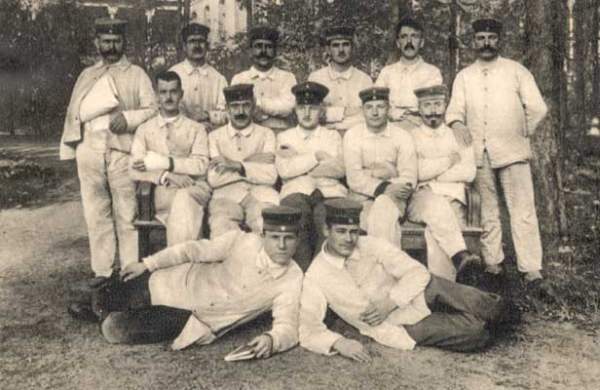
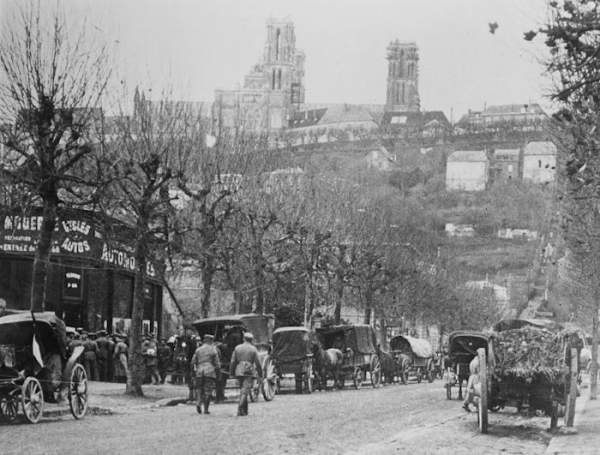
1918 World War I: Various:
Western Front: The US First Army advances, smashing through the last German positions northeast and west of Buzancy, thus enabling the French Fourth Army to cross the Aisne.
Mesopotamia: Cobbe's British cavalry reaches Mosul. Despite provisions of the October 30 armistice, Cobbe is ordered to take the city. After some initial squabbling, the Turkish garrison of Halil Pasha marches out and the British remain.
Karl Liebknecht calls for a revolution in Gemany:

For more than four years our rulers have been engaged in a robber war for the oppression of our neighbours. During the last ten or twelve years these same rulers have preached the bad doctrine of "Slavic danger." They sowed in our hearts fear of the Slavs. But this was merely camouflage for further imperialistic aggression. As if the way to St. Petersburg lay through Belgium and northern France, they gave orders to let the armies loose. During these four years the peoples of the world have bled until they can bleed no more. And what have we won? Have we won one hundredth part of what we and our rulers started out to get? Instead of this, we have lost until we have nothing more to lose. One thing we have won - the hatred of mankind. [For further details, Click here.]
The West Ukrainian People's Republic is proclaimed:
The Habsburg monarchy was the perfect ground for the development of both Polish and Ukrainian national movements. The first incident happened in 1897, when the Polish administration opposed the Ukrainians in parliamentary elections. Another conflict developed in the years 1901-1908 around the University of Lwów, where Ukrainian students demanded a separate Ukrainian university, while Polish students and faculty attempted to suppress the movement. The turning point, however, came in 1903, when both Poles and Ukrainians held their separate conferences in Lwów (Poles in May and Ukrainians in August). Afterwards, the two national movements developed with contradictory goals, leading towards the later clash.
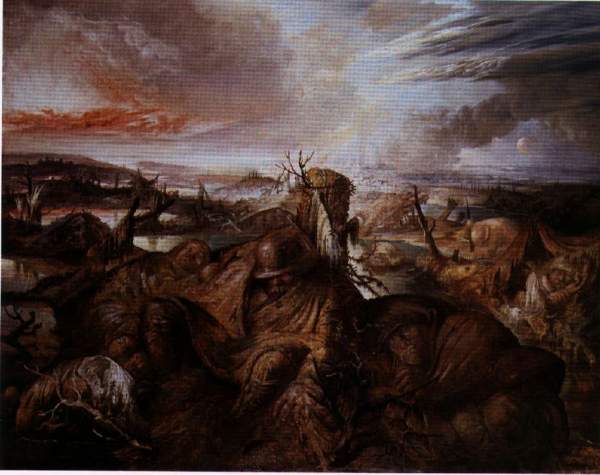
World War I (Oct 15 - Nov 10): Gefreiter Adolf Hitler, blinded in a gas attack near Werwick on Oct 14, recovers in the Prussian Reserve Hospital at Pasewalk near Berlin. The doctors at this army hospital, on the cutting edge of medical treatments for gassed soldiers, provide Hitler with very good care, and his sight slowly and painfully begins to return to him over these few weeks. Hitler falls into a deep depression. After over four years on the front lines, his fighting days are over. In four years of war, the List Regiment has lost 3,754 dead, 8,795 wounded, with 678 taken prisoner. This is somewhat above the average for the German Armed Forces as a whole.
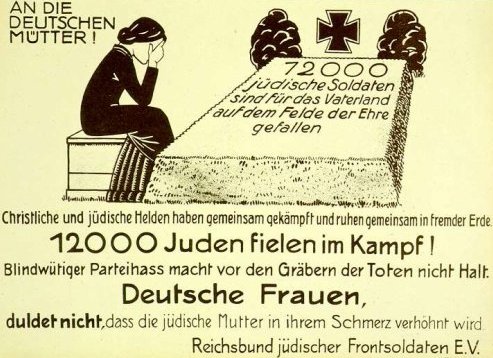
Throughout the length of the war, fifty-nine Jews served in the List Regiment, sixteen of these as officers. Thirty percent of the Jews in the List Regiment were honored for bravery, and seventeen percent were killed in action.[For further details, Click here.]

1919 President Wilson is again in control of most of his faculties, although he never fully recovers. Note: There is no provision in the law at this time for declaring a president unable "to discharge the powers and duties of the said office."
1923 Goodyear Tire and Rubber Company of the US purchases the rights to manufacture Zeppelin dirigibles from Germany.
1924 Voelkishness: Karl Maria Wiligut (Weisthor) is committed to a Salzburg mental asylum and will not be released until early 1927.
1926 The Supreme SA leadership is constituted as Goebbels embarks on his 'conquest of Red Berlin':
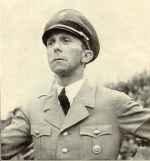
Joseph Goebbels first came to Hitler's attention and experienced a quick rise in the Nazi hierarchy. Goebbels, a brilliant but somewhat neurotic would-be writer, displayed huge talents for speech making, organizing, and propaganda. He was a rarity among the Nazis, a highly educated man, with a Ph.D. in literature from Heidelberg. Goebbels was a little man, about five feet tall, who walked with a limp . . . . He kept a diary which reveals how quickly he became infatuated with Hitler. "Great joy. He greets me like an old friend. And looks after me. How I love him.
1928 The Graf Zeppelin sets an airship distance record of 6384 km.
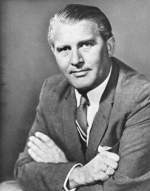
1932 Weimar: Wernher von Braun is named head of the German liquid-fuel rocket program. [For further details, Click here.]
1933 Various:
Zionism: The Conference for Relief of German Jewry closes in London. It has adopted resolutions calling for Palestine to be the primary location for resettling Jewish refugees and the establishment of a central allocation committee and a central bureau to coordinate the work of the various groups dealing with German-Jewish problems. (THP)
The United States officially recognizes the Soviet Union.
1935 Holocaust: The German citizenship of Jews is officially revoked. The Nazi government announces that the Nuremberg Laws apply to all Jews, German or foreign, without exception. (THP)
1936 Axis:
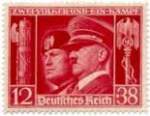
In a speech in Milan, Italy, Benito Mussolini described the alliance between his country and Nazi Germany as an "axis" running between Rome and Berlin. (AP)
[Note: An entry in Wikipedia claims that "The term 'axis' is believed to have been first coined by Hungary's fascist prime minister Gyula Gömbös, who advocated an alliance of Germany, Hungary, and Italy."—Ed.] [See also: How Did the Pact of Steel Effect Germany and Italy?]
1937 Protocols: The Swiss Court of Criminal Appeal quashes the judgment of the lower court's verdict on the authenticity of The Protocols of the Elders of Zion in its entirety. (See May 14, 1935)
1939 World War II: Various:
Poland: Germany formally annexes western Poland, Danzig and the Polish Corridor. This adds the new districts of Posen, Greater East Prussia and Danzig West Prussia to the Reich.
Memorandum by the State Secretary in the German Foreign Office (Weizsaecker):
Field Marshal Goering, Grand Admiral Raeder, and Colonel General Keitel, independently of each other, have told me that the Russian delegation in Berlin expected too much in the way of inspection and procurement of German materials of war. Colonel General Keitel told me it was the Fuehrer's opinion that materials regularly issued to troops could be shown to the Russians; what might be sold, we had to decide ourselves. Things in the testing stage or otherwise secret should not be shown to the Russians.
The first jet plane, a Heinkel He 178, is demonstrated to the German Air Ministry: The Heinkel jet engine was the brainchild of a brilliant young German scientist named Pabst von Ohain, who was only 25 years old when the He-178 made aviation history. The aircraft itself was designed by Heinkel engineers, working under the personal direction of Ernst Heinkel, head of the Heinkel aircraft manufacturing company. That firm financed the development of the He-178 without either the knowledge or financial support of the Nazi government. [For further details, Click here.]
1940 The first US air raid shelter is built at Fleetwood, Pennsylvania.
1941 World War II: Various:
War at Sea: The German government issues a statement denying the charges made by President Roosevelt that the US destroyers Greer and Kearney were attacked by German submarines without any provocation; that the exact opposite was true in that the U-boats fired torpedoes only after they were tracked and depth-charged for hours by these US vessels.
Vichy France opens a punishment and isolation camp at Hadjerat-M'Guil in Algeria. It contains 170 prisoners nine of whom are tortured and murdered in conditions of the worst brutality. Two of the murdered were Jews, one of whom had earlier been released from a concentration camp in Germany in 1939 and fled to France. (THP)
Holocaust: Nov 1-15 The Jews of Bukovina, like those of Bessarabia, are uprooted from their homes in more than 100 communities, then marched away and interned. Within a year, more than 120,000 of them will have died. (THP)
FDR puts Coast Guard under control of the Navy:
On this day in 1941, President Roosevelt announces that the U.S. Coast Guard will now be under the direction of the U.S. Navy, a transition of authority usually reserved only for wartime.
The Coast Guard was established as the Revenue Marine Service by Alexander Hamilton, secretary of the treasury, in 1790. In 1915, the U.S. Lifesaving Service, formed in 1878, and the RMS combined to become the Coast Guard. During peacetime, the Guard was under the direction of the Department of Treasury until 1967, when the Department of Transportation took control. But during war, it was under the control of the U.S. Navy. What made FDR's November 1 announcement significant was that the United States was not yet at war—but more and more American ships were nevertheless becoming casualties of the European war.
The Coast Guard's mission is to enforce all laws applicable to the waters within U.S. territory, including laws and regulations promoting personal safety and protection of property. It provides support and aid to all vessels within U.S. territorial waters. It is charged with inspecting sailing vessels and their equipment for violations of safety regulations, as well as lighthouses, buoys, navigation equipment, and radio beacons. The Guard operates and maintains a network of lifeboat and search-and-rescue stations, which also employs aircraft.
The Guard's wartime duties include escorting ships, providing port security, and inspecting ships for everything from illegal drugs to munitions. They also have powers of interdiction—the right to stop, board, and inspect any vessel suspected of threatening U.S. security. In fact, Coast Guard ranks are analogous to those of the U.S. Navy; even the uniforms are similar. The Guard is headed by an admiral appointed by the president. Women have served in the Guard since 1973. (History.com)
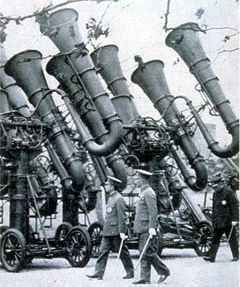
The Japanese Combined Fleet changes its radio code.
[See: Countdown to Infamy: Timeline to Pearl Harbor.]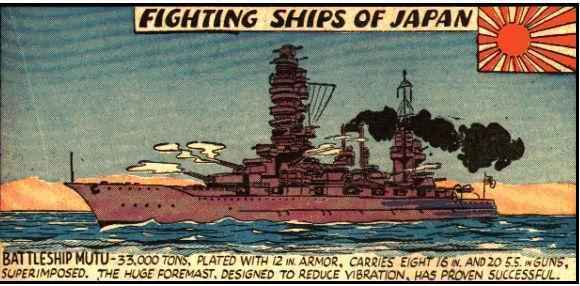
From the Diary of Captain Shigeshi Uchida:
The Liaison Conference between the Cabinet and the High Command reached a conclusion to go to war with the US by 0100 on the 2nd. (Dillon)
1942 World War II: Various:
Caucasus: In their advance toward Ordshonikidse, German forces under von Mackensen capture Alagir on the upper Terek river.
Holocaust: Professor Fischer retires. His successor as Director of the KWI of Anthropology, Human Heredity, and Eugenics is Professor von Verschuer.
1943 World War II: Various:
War in the Pacific: American troops invade Bougainville in the Solomon Islands. In support of the landings on Bougainville, US aircraft carrier forces attack the huge Japanese base at Rabaul, just to the north.
Russian Front: The Red Army achieves a landing across the Strait of Kertch from the Taman peninsula to the Crimea.
1944 World War II: Netherlands: Start of an offensive by Canadian forces against German positions on the Dutch island of Walcheren in the Scheldt estuary.
1949 Nuremberg Tribunal: The widow of General Ludendorff, on trial at Nuremberg, explains why her husband broke with Hiter, stating:
As early as the summer of 1929 James P. Warburg had undertaken an assignment from financial circles in America, which desired to exercise solitary influence on Germany in the unleashing of a national revolution. Warburg's task," she said, "was to find the suitable man in Germany, and he entered into contract with Adolph Hitler who subsequently received sums of money amounting to 27 million dollars up to January 30, 1932, and still another seven million thereafter, enabling him to finance his movement." (THP)
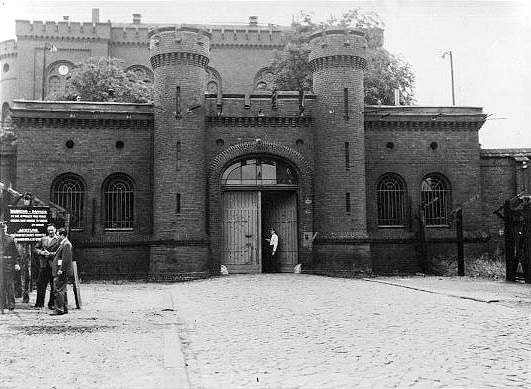
1950 Spandau Prison: From Spandau: The Secret Diaries, by Albert Speer:
After three years of vainly searching the cells every day, this afternoon the Russians found something in Schirach's bed: a ball of horse manure, carefully wrapped in paper, presumably from the manure we use in the garden.

1950 An assassination attempt threatens President Harry S. Truman: On this day, Griselio Torresola and Oscar Collazo attempt to assassinate President Harry S. Truman at the Blair House in Washington, D.C. Truman escaped unscathed. [For further details, Click here.]
1952 United States tests first hydrogen bomb:
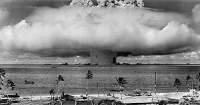
The United States detonates the world's first thermonuclear weapon, the hydrogen bomb, on Eniwetok atoll in the Pacific. The test gave the United States a short-lived advantage in the nuclear arms race with the Soviet Union. Following the successful Soviet detonation of an atomic device in September 1949, the United States accelerated its program to develop the next stage in atomic weaponry, a thermonuclear bomb. Popularly known as the hydrogen bomb, this new weapon was approximately 1,000 times more powerful than conventional nuclear devices. Opponents of development of the hydrogen bomb included J. Robert Oppenheimer, one of the fathers of the atomic bomb. He and others argued that little would be accomplished except the speeding up of the arms race, since it was assumed that the Soviets would quickly follow suit.The opponents were correct in their assumptions. The Soviet Union exploded a thermonuclear device the following year and by the late 1970s, seven nations had constructed hydrogen bombs. The nuclear arms race had taken a fearful step forward. (History.com)
1993 European Union goes into effect:
The Maastricht Treaty comes into effect, formally establishing the European Union (EU). The treaty was drafted in 1991 by delegates from the European Community meeting at Maastricht in the Netherlands and signed in 1992. The agreement called for a strengthened European parliament, the creation of a central European bank, and common foreign and security policies. The treaty also laid the groundwork for the establishment of a single European currency, to be known as the "euro." [For further details, Click here.]
1998 The European Court of Human Rights was instituted as a permanent court with full-time judges to monitor compliance by the signatory parties of the European Convention on Human Rights. [For further details, Click here.]
Edited by Levi Bookin (Copy editor)
levi.bookin@gmail.com



Click to join 3rdReichStudies



Disclaimer: This site includes diverse and controversial materials--such as excerpts from the writings of racists and anti-Semites--so that its readers can learn the nature and extent of hate and anti-Semitic discourse. It is our sincere belief that only the informed citizen can prevail over the ignorance of Racialist "thought." Far from approving these writings, this site condemns racism in all of its forms and manifestations.
Fair Use Notice: This site may contain copyrighted material the use of which has not always been specifically authorized by the copyright owner. We are making such material available in our efforts to advance understanding of historical, political, human rights, economic, democracy, scientific, environmental, and social justice issues, etc. We believe this constitutes a "fair use" of any such copyrighted material as provided for in section 107 of the US Copyright Law. In accordance with Title 17 U.S.C. Section 107, the material on this site is distributed without profit to those who have expressed a prior interest in receiving the included information for research and educational purposes. If you wish to use copyrighted material from this site for purposes of your own that go beyond 'fair use', you must obtain permission from the copyright owner.
Please Note: The list-owner and the moderator of 3rdReichStudies are not responsible for, and do not necessarily approve of, the random ads placed on our pages by our web server. They are the unfortunate price one pays for a 'free' website.